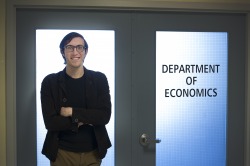Number lover

Michael Sullivan loves numbers.
His enthusiasm for the patterns and theorems of mathematics combined with an interest in history has led Mr. Sullivan to what is obviously a perfect match for his abilities – the study of macro economics.
That perfect match is already taking him far – later this summer he will leave Newfoundland for a one-year research assistant position at Stanford University. In the 2017-18 academic year he plans to pursue a PhD in economics at Yale University, where he has already been offered a scholarship.
“Economics provides a mathematical way of understanding things that historians and social scientists study,” said Mr. Sullivan who began his career at Memorial studying history and political science. He explains that economists use math like a language in order to study social problems.
“Some ideas are best expressed verbally – others require models that quantitatively connect the ideas you are working with.”
He says it begins on the page, with writing down ideas and thoughts that ask what the relationship is between various variables in society.
“Then it becomes a matter of more rigourously asking what connects these things, so you can write a mathematical model, collect some data and see whether the model you have hypothesized actually fits data. That isn’t something you can do with purely verbal information.”
Among the variables economists study are the relationships between inflation and unemployment and between government spending and economic growth.
Mr. Sullivan worked closely with CARE (Collaborative Applied Research in Economics) on “Promoting Tax Fairness in Newfoundland and Labrador,” a 2015 paper explaining how changes in the income tax system in Newfoundland and Labrador affect different segments of society (income groups, families, men and women). The variable in this case is the tax rate and how it affects economic wellbeing and who wins and loses when government changes their tax policy.
“One of our conclusions was that if government wanted to reduce inequality and poverty they should consider just transferring money directly to low income people. Of course the deficit reduction levy in the recent budget appears to do almost the opposite.”
He easily articulates the link between history and economics using the example of the colonization of the New World, in particular Spain’s colonization of what is currently Latin America. At the time Spain conducted a lot of silver mining, significantly increasing the world’s supply of silver coins. The effect back in Europe was that the prices of goods went up dramatically.
“This would be perfectly anticipated by any economist who studies the relationship between the supply of money and prices,” said Mr. Sullivan. “This also corresponded with the massive growth of Spain’s army who were paid with these new coins. They were stimulating the economy above what it could reasonably produce with this artificial influx of coinage.”
According to Mr. Sullivan, this is the sort of situation the Bank of Canada currently studies in order to maintain our money supply and avoid buying power being eroded overnight.
A St. John’s native, Mr. Sullivan is currently working with Dr. Doug May on a project looking at labour mobility in mining and the oil and gas sectors that examines how outcomes changes when people switch industries or leave certain provinces.
He credits the individual attention received from various members of the economics department for “making his education.”
According to department head Dr. Wade Locke, the feeling is mutual.
“Michael epitomizes all of the positive attributes of a great student and focuses on the beauty of learning for the sake of learning,” said Dr. Locke. “He writes and communicates effectively and understands mathematics as a tool to convey complex ideas. Michael is a phenomenal student. I wish him all the best in his future career.”
Mr. Sullivan is less interested in the computational side of math and more drawn to proving theorems.
“It’s about taking a few beginning facts and coming to a new one. I do think mathematics is a language but it is one with very strict definitions – you can use the patterns and come to new conclusions around them.”
He says he found math increasingly engaging the more advanced it became.
“Much in the same way as English, before you can read a thought-provoking work of philosophy you need to know the rudiments of language and spelling. So much of early math is learning arithmetic and basic algebra. Once you have those skills you can do the more exciting stuff. What I enjoy now is tackling a difficult problem and getting one of those eureka moments upon discovering the technique used to solve it.”
When asked, Mr. Sullivan describes some of the mathematical problems he most enjoyed studying. One of these is the Weierstrass Approximation Theorem, which Mr. Sullivan casually states as the fact that every continuous function can be uniformly approximated by a polynominal on any interval to any degree of accuracy.
Gulp. Stanford isn’t going to know what hit them.